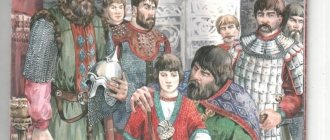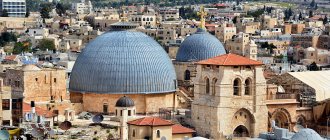"Supporting stone for love." Grand Duke Sergei Alexandrovich Romanov
“Saints are not born, but made.” And Grand Duke Sergei Alexandrovich became a martyr not in one day. Throughout his life he strived for this feat. As his teacher, Captain-Lieutenant Arsenyev, testifies, from childhood Sergei Alexandrovich “always prayed very diligently and attentively.”His favorite saints were the Monk Sergius of Radonezh and his disciple Savva Storozhevsky. Born in St. Petersburg, the prince constantly gravitated towards Moscow and its shrines. He gave his strength to Moscow and ended his days in Moscow.
An important event for him was a visit to the Holy Land, with which his whole life was connected. During the trip, he personally saw the bleak state of Orthodoxy in Palestine and became convinced of the difficult and helpless situation of Russian pilgrims, especially the common people. In 1868, he bought the famous Oak of Mamre, and then began to buy plots of land that were important for pilgrims and set up hotels for them. Prince Sergius becomes the head of the Orthodox Palestine Society, of which he was chairman for 23 years, until the end of his life.
There is evidence that his father, Alexander II, told the chairman of the Palestinian committee, Prince Obolensky: “This is a matter of the heart for me.” The Holy Land also became a “question of the heart” for Prince Sergius. There is nothing in the world by chance. Prince Sergius represented the Imperial Family at the consecration of the Church of St. Mary Magdalene in the Garden of Gethsemane. It was built by the Romanovs. Grand Duchess Elizabeth said: “How I would like to be buried here.” The Lord, as we know, fulfilled her wish. The relics of the Holy Martyr Elizabeth rest here. The room in which they were first discovered, according to eyewitnesses, was filled with “a strong smell, as if of honey and jasmine.”
Truly, the Lord Himself, by His grace, miraculously united these two lives and two deaths. Converting to Orthodoxy, the Grand Duchess wrote to her father, the Duke of Darmstadt: “When I saw how deeply religious Sergei was, I felt behind him, and the more I got to know his Church, the more I felt that it was bringing me closer to God.” . When she announced her intention to join the Orthodox Church, her husband, according to one of the former courtiers, “tears involuntarily flowed from his eyes.” It is significant that in the glorification of St. Seraphim of Sarov, the prophet of the future trials of Orthodox Russia, Grand Duke Sergei Alexandrovich and Grand Duchess Elizaveta Feodorovna took an active part together with the royal family, which will soon lead the host of new Russian martyrs and confessors.
Since the mid-nineteenth century, the enemies of Orthodox Russia have become more active. Nests of terrorists have emerged. They were directed against the Russian Empire. Their goal was, first of all, those close to the house of the Romanovs and the sovereign himself - “restraining,” in the words of the holy righteous John of Kronstadt, the unhindered spread of evil. The killings started with the best. Russia shuddered from the assassination of Alexander II. He was the first to take the blow directed against faith and the Fatherland. This open terrorism came from the grassroots, mainly from foreigners and marginalized propaganda compatriots. Their task was to destroy Russia. To weaken and intimidate by killing the best - those who restrained lawlessness and did not allow it to rampant. And in this struggle, the family of the Romanov dynasty suffered the greatest sacrifices.
The fourth son of Tsar-Liberator Alexander II was killed just like his august parent - by a bomb thrown by a member of a terrorist organization whose goal was to overthrow the autocracy at any cost. This murder was committed on February 17 A.D. Art. 1905 in the very heart of Moscow - in the Kremlin, among the great Russian shrines. The sacred place, which Alexander III called the altar of Russia, was stained with the martyr's royal blood. Immediately after the explosion, the wife of the Grand Duke, the future Martyr Elizabeth, ran out of the palace. She still had the strength, with great self-control, to piece together her husband’s body, which had been torn to pieces. The pectoral cross and icons have survived. It was a symbol of Russia, which its enemies would soon try to tear into pieces.
It is no coincidence that the remains of the Grand Duke were laid in the Alekseevskaya Church of the Chudov Monastery in the Kremlin, near the relics of St. Alexy, Metropolitan of Moscow, one of his favorite saints, who worked hard to unite fragmented Rus'. A monument-cross was erected at the site of the death of the Grand Duke. It is symbolic that the words of the Savior were engraved on the cross: “Father, let them go, for they do not know what they are doing” (Luke 23:34). Grand Duchess Elizabeth also shared the grace of these words, “forgiving her husband’s murderer in the gospel.” With these same words she will pray for her murderers, having been thrown into the Alapaevsk mine by them. It is also symbolic that after the revolution this cross will be thrown from the pedestal by Lenin with his own hand.
One of the articles published shortly after this crime was headed: “Why was he killed?” It gave a precise answer to this question. “To deprive Russia, not only at the present time, but also in the future period of its revival, of strong and convinced defenders - this is the vile goal of our underground and “legal” revolutionaries. That is why they attacked Grand Duke Sergei Alexandrovich with fierce anger, sensing in him a man not only of the past, but also of the future.” The destroyers of Russia rightly considered the Grand Duke to be the head of the “resistance party,” although by that time, disagreeing with the government’s indecisive measures against the threat of a coup, he resigned from the post of Governor General of Moscow and remained only the commander of the Moscow Military District. This crime was not political, but spiritual. It precedes the beginning of persecutions unprecedented in history.
And Grand Duke Sergei Alexandrovich can be called a “spies” (Joshua 2:1) - one of those who goes ahead of the entire Church to the Promised Land. All saints are spies, they do what all Christians should do - not by outward imitation, but by determination to follow Christ. Christianity needs spies. Without them, even having established itself in the world, it becomes familiar, banal, ready to make endless compromises. And without them it cannot continue its path in new generations. Saints are also unrecognizable and invisible, like spies. But this invisible presence of theirs may be the condition thanks to which they, living next to us, can make us true disciples of Christ.
The martyrdom of Grand Duke Sergius opens the age of holy martyrs. The funeral service for the Grand Duke was conducted by the future martyr Metropolitan Vladimir (Epiphany). Father Mitrofan of Srebryansky (the future Reverend Confessor Sergius) called the Grand Duke “a new martyr of the reigning house, a martyr for truth,” and the future Hieromartyr John Vostorgov - “a martyr of duty.” Many future new martyrs testified these days that Grand Duke Sergius knew about the death that threatened him, but never wanted to give in to the enemies of Orthodoxy and Russia.
Today we are again invited to think about why our Church is called the Church of New Russian Martyrs and Confessors and what it means that we belong to it. The martyr follows his Lord in words and deeds, and then in his death. That is why the Lord says: “Where I am, there will my servant also be.” After Christ showed obedience to the point of death and the death of the Cross for our salvation, there is no death that we should not accept if we are truly Christians. But we reach His Cross only by Him, by His love, which supports us and carries us. He drank the bitter cup to the brim and now gives it to us, filling it with the heavenly wine with which He delighted His martyrs. And when He asks us if we can drink the same cup as Him, we must answer what the two apostles answered Him: “We can.” Lord, we can do this, but not in our own strength, but in the strength that we expect from You. Your Cross and Resurrection give us more than strength and courage. They free us from fear and pride. As we stand before the risen Christ, we must see what we are called to be.
Circumstances when it is necessary to sacrifice life after the cessation of open persecution are rare. But circumstances when courage is needed to be true to one’s duty and one’s conscience occur more often than is commonly thought. You can easily verify this without fear of exaggeration. In the Church, as well as in the state, whatever it may be, there is no person for whom loyalty to the light of Christ and his duty would not be worth the sacrifice. The fact that these circumstances, when sacrifice is required, are little noticed, means that many protect themselves from afar, belittling their Christian duties so that they do not have to bring them to the point of sacrifice. Reducing them to easy superficial service, consistent with their internal dispensation. Or by performing courageous acts which are only impulses, fueled by passing decency, but the root of which is rather pride than Christian virtue.
Just as it is a shame to be weak and timid, it is not easy to admit that a duty that we are not ready to fulfill makes us unworthy of the Christian name. The fulfillment of this duty is hindered and questioned. They even look at it as a reprehensible excess, trying to cover up their apostasy or justify it. And many of those who judge this way affirm and console a new multitude of those who are looking for an example of protection from the truth that bothers them and does not allow them to live in peace. But a good example, like a bad one, is contagious.
After the murder of Grand Duke Sergei Alexandrovich, Archimandrite Anastasy (Gribanovsky) said that the villains wanted to stain the Kremlin with royal blood, but only “created a new supporting stone for love of the Fatherland” and gave “Moscow and all of Russia a new prayer book.”
Archpriest Alexander Shargunov
Bastards of the Romanovs: recognized and unrecognized
In general, all Romanov bastards must be divided into two large groups: officially recognized illegitimate children and those to whom kinship with the ruling house is only attributed. There is also a right to life in the statement that representatives of the dynasty could have children born as a result of very lightning-fast romances, and therefore did not come to the attention of the general public and remained unknown.
The fate of the child directly depended on whether he was officially recognized as a descendant of the royal house or not. In this regard, the fates of several recognized bastards are indicative.
The illegitimate son of Catherine the Great from Grigory Orlov, Alexey Grigorievich Bobrinsky, lived in luxury, received the title of count and extensive estates. His promotion was supervised by his crowned mother, and he managed to rise to the rank of major general.
The biography of another darling of fate, the son of Alexander II and Princess Dolgoruky, Georgy Yuryevsky, is also indicative. Upon his father's accession to the throne, he received the title of His Serene Highness.
In this sense, the life story of the bastard Paul I looks very unprepossessing.
Semyon the Great: circumstances of birth
The boy was not born out of love, but rather was the by-product of a rather strange relationship that occurred under the direct coercion of Paul's mother, Catherine the Great.
At the age of 17, Pavel Petrovich became seriously ill. Rumors immediately spread in court circles that the serious result of the disease was a terrible illness - loss of male strength. Catherine, seriously puzzled by this unexpected turn of events, entrusted one of her ladies-in-waiting, Sofya Ushakova, to check whether this was so. A romance broke out between the twenty-six-year-old favorite and the young prince, as a result of which a boy was born in 1772. Russian writer Nikolai Grech describes the circumstances of the child’s birth as follows:
“Before Emperor Paul entered into his first marriage, they gave him some virgin to initiate him into the mysteries of Hymen. The student showed success, and the teacher got pregnant. A son was born. He, I don’t know why, was nicknamed Semyon Ivanovich the Great and was brought up zealously.”









